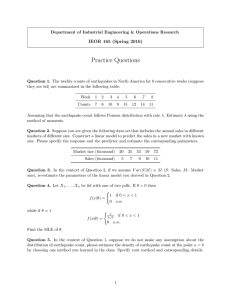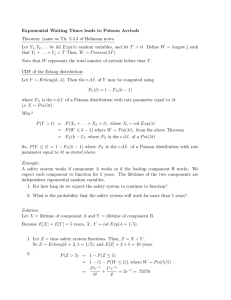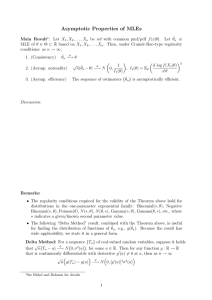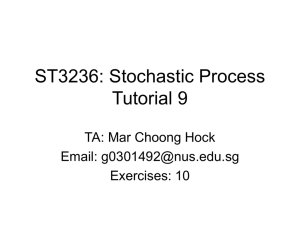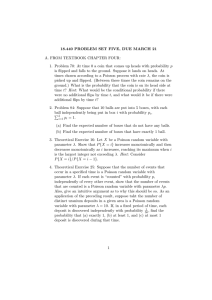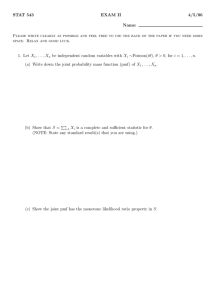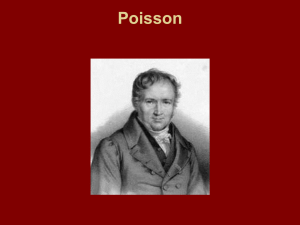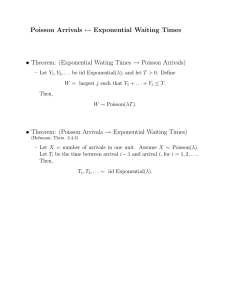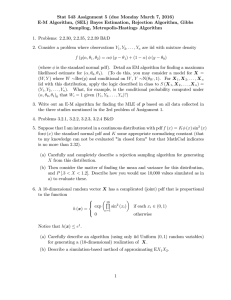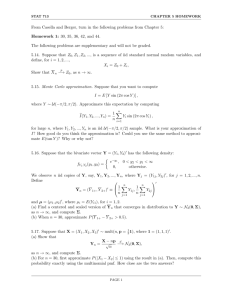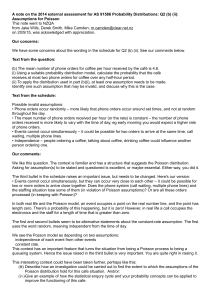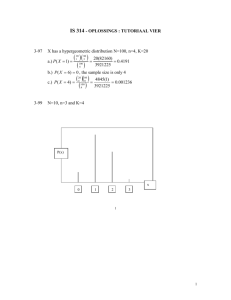Document
advertisement
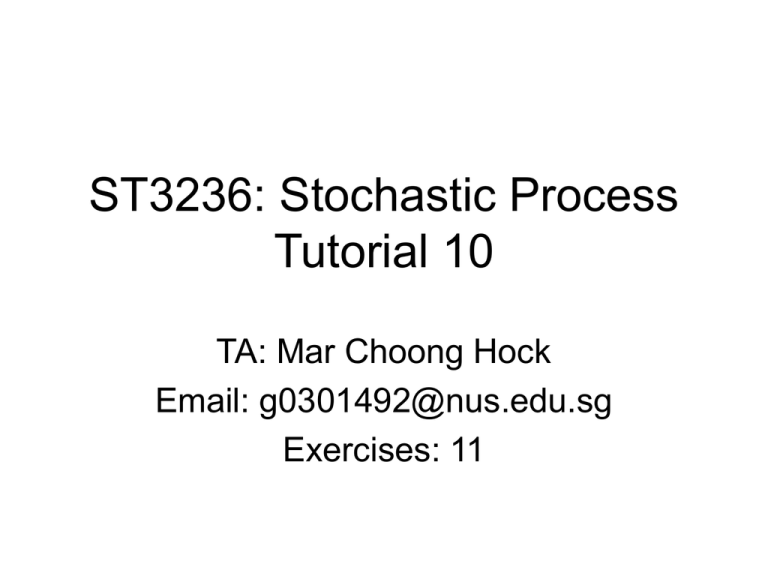
ST3236: Stochastic Process
Tutorial 10
TA: Mar Choong Hock
Email: g0301492@nus.edu.sg
Exercises: 11
Question 1
For i = 1, … , n. Let {Xi(t) : t > 0} be independent
Poisson processes, each with the same
parameter . Find the distribution of the first time
that at least one event has occurred in
every process.
Question 1
Note: You can give either the c.d.f. or the p.d.f. as
the answer for this case, the c.d.f. is
F(t) = 1 - {1 - exp(-t)}n
Question 2
Let {X(t) : t 0} be a Poisson process of rate .
Suppose it is known that X(t) = n. For n = 1, 2, … ,
determine the mean of the first arrival time W1 and
Wn .
Note: The Wn here is conditioned on X(t) = n. This is
different from tutorial 9.
Question 2
Let Y1, … , Yn be IID and uniformly distributed on
(0, t]. Then W1 has the same distribution as Y(1)
and Wn has the same distribution as Y(n).
Note: Yi is a random variable that represents the
position of customer i, on the time axis (measured
w.r.t t = 0), after placing the customer on the axis
(uniform distribution). It is not necessary the ith
arrived customer.
By definition, Y(1) = min {Y1, Y2, …, Yn}, that is, it is
the first arrived customer.
Question 2
Then W1 has the same distribution as Y(1) and Wn
has the same distribution as Y(n) (since it is the
maximum of all Yi it represents the last arrived
customer). The distribution of Y(1) is
Question 2
Question 2
Question 3
Let {X(t) : t 0} be a Poisson process of rate .
Suppose it is known that X(t) = 2.
Determine the mean W1W2, the product of the first
two arrival times
Question 3
Let Y1 and Y2 be IID and distributed uniformly on (0; t].
We have
E(Y1) = E(Y2) = t/2
Let Y(1) and Y(2) be the order statistics of Y1 and Y2.
Then (W1, W2) have the same distribution as (Y(1),
Y(2)). Because
Y(1)Y(2) = Y1Y2
Thus
E(W1W2) = E(Y1Y2) = E(Y1)E(Y2) = t2/4
Question 4
Customers arrive at a certain facility according to a
Poisson process of rate . Suppose that it is know
that five customers arrived in the first t hours.
(a)Determine the mean total waiting time
E{W1 + … +W5 | X(t) = 5}
(b) Determine the mean total waiting time
E{W1 + … +W5 +W6 | X(t) = 5}
Question 4
Let Y1, …, Y5 be IID and distributed uniformly on
(0, t]. We have
E(Y1) = … = E(Y5) = t/2
Let Y(1), …, Y(5) be the order statistics.
Then (W1, … ,W5) have the same distribution as
(Y(1), … , Y(5)). Because
Y(1) + … + Y(5) = Y1 + … + Y5
Question 4a
Thus
E(W1 + … +W5 | X(t) = 5)
= E(Y1 + … + Y5)
= E(Y1) + … + E(Y5)
= 5t/2
Question 4b
E{W1 + … +W5 +W6|X(t) = 5}
= E{W1 + … +W5 | X(t) = 5 } + E {W6 | X(t) = 5}
= 5t/2 + (t +1/)
(See lecture notes for the calculation of
E{W6 | X(t) = 5} )
